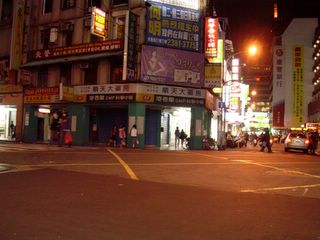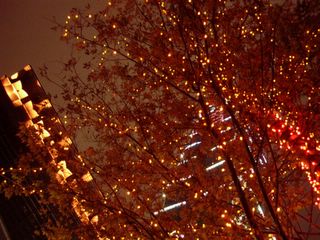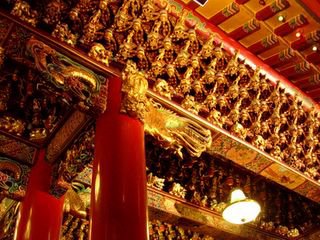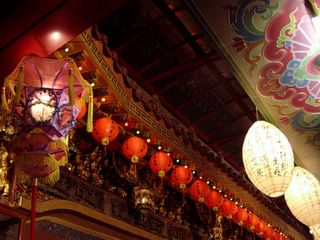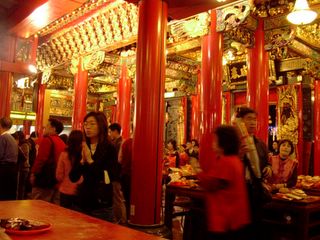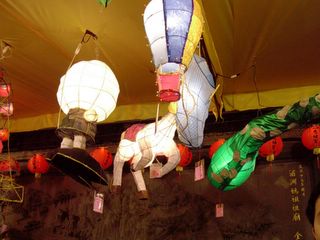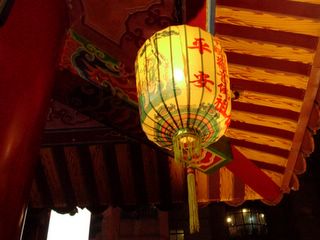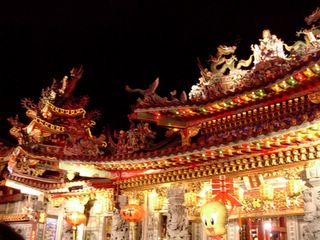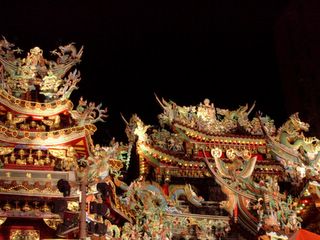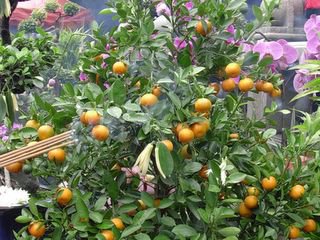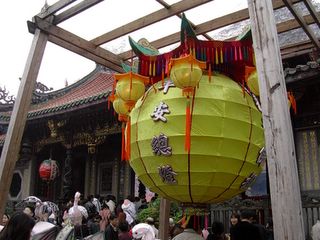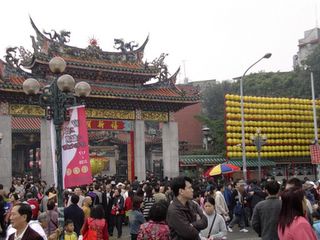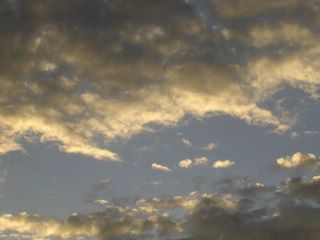The fireworks keep exploding, near and far. Still the new year period.
Another trip tomorrow, this time to the south, to the place where my parents are from, where my many of my relatives still are.
It's tradition to go back to the 'place you're from' in this festive season. But we decided to postpone the trip to avoid the horrible traffic jams. By tomorrow, there shouldn't be too much traffic on the highway going south.
Not sure what to expect, but perhaps expecting nothing is best. There's bound to be the usual small-talking, smiles and repeats of what everone's been doing. And what of the 'sensitive' subjects? Not sure how people will respond...not sure how I'll respond.
What will be will be.
Thursday, February 02, 2006
A commercial
Just saw a touching commercial of an energy drink.
Narrator telling the story of hard-working labourers...
Something along the lines of:
"New Year's time, and most people get big bonuses and dividends from shares. Us labourers, we don't have anything. When the weather is cold, we work outside. When it's hot, we have to bear to heat. In construction, the work never stops. We risk our lives, and sometimes get injured, but we continue working. At a time like new year, we don't have much to give to our families. Just a small amount of money we save up and we give it to the children. When the children say "Thank you!", that's our greatest gift. Then we know that our labour and toil is worth something"
Touching, is it not?
Everyday, we pass so many construction sites, building skyscrappers, underground railways, digging tunnels, connecting bridges. They may be locals, or they may be workers from far away countries. But they continue to silently work and toil for meagre pay, for our benefit. When do we get the change to say "thank you"?
Thank you, to those invisible, unheard and voiceless people who make this society function.
A thank you long overdue.
Narrator telling the story of hard-working labourers...
Something along the lines of:
"New Year's time, and most people get big bonuses and dividends from shares. Us labourers, we don't have anything. When the weather is cold, we work outside. When it's hot, we have to bear to heat. In construction, the work never stops. We risk our lives, and sometimes get injured, but we continue working. At a time like new year, we don't have much to give to our families. Just a small amount of money we save up and we give it to the children. When the children say "Thank you!", that's our greatest gift. Then we know that our labour and toil is worth something"
Touching, is it not?
Everyday, we pass so many construction sites, building skyscrappers, underground railways, digging tunnels, connecting bridges. They may be locals, or they may be workers from far away countries. But they continue to silently work and toil for meagre pay, for our benefit. When do we get the change to say "thank you"?
Thank you, to those invisible, unheard and voiceless people who make this society function.
A thank you long overdue.
Broketear Movie
Just went see what seems like the movie of the year: Brokeback Mountain.
Again, moved to tears and laughs by this great movie directed by Ang Lee (credits too to Annie Proulx for writing the original novel). All the media hype and discussions about the movie would make you think it's a gay movie...but it's not at all. The main characters are gay, yes, but that's just one small (though not unimportant) aspect of a great love story.
Story begins in the barren countryside of Wyoming in the 1960s. Two young cowboys happen to be at the right place at the right time. Through one summer working as sheep herders up in the mountains, the landscape in all its loneliness and beauty bring these seemingly rough and buff men together, in love. At first, just silent glances stolen at one another when the other is not looking...then, perhaps because of the cold, or because of the deep underlying attractions already brewing from the beginning, a passionate (explicit perhaps) love scene unites their hearts and fates forever. On the rugid backs of Brokeback, love sows its seeds.
But it is a love that 'dares not speak its name'. For in an age, in a culture, and in a place where beer-guzzling and chimney-smoking cowboys meet the musts of marriage, family, children and seeing life through from day to day, such homosexual love, however intense, passionate and heart-felt, has no air to breath. So they both 'settle down' and make do, but struggle to keep up appearances within the confines of their social obligations. Only during occassional meetings in the shadows of Brokeback do they dare express passions and feelings so strong yet so suppressed. Love, in all its purity, and ups and downs brings these two men together, but also sets them apart.
The movie really captures that human side, and sends a powerful message that love ignores insignificant issues whether you are gay, a cowboy or under great social pressures. Sort of reminded me of 'The Wedding Banquet' 喜宴(1994), which has a similar theme running through it. Even in a sleepy forgotten land, a rich and emotional story of two people can develop and endure. The soft country classics and lyrics, together with moving guitar and harmonica themes add that special touch to the movie. More than once I was moved to tears (and it's been a while since a movie had this effect on me)...the love scene, the partings, the hugs, the goodbyes and unbearable longings. Simply brilliantly directed, acted and choreographed.
Oh, how wonderful it is to be in love...
For those who are not, this movie will remind you of that feeling.
Go experience for yourself! : )
Again, moved to tears and laughs by this great movie directed by Ang Lee (credits too to Annie Proulx for writing the original novel). All the media hype and discussions about the movie would make you think it's a gay movie...but it's not at all. The main characters are gay, yes, but that's just one small (though not unimportant) aspect of a great love story.
Story begins in the barren countryside of Wyoming in the 1960s. Two young cowboys happen to be at the right place at the right time. Through one summer working as sheep herders up in the mountains, the landscape in all its loneliness and beauty bring these seemingly rough and buff men together, in love. At first, just silent glances stolen at one another when the other is not looking...then, perhaps because of the cold, or because of the deep underlying attractions already brewing from the beginning, a passionate (explicit perhaps) love scene unites their hearts and fates forever. On the rugid backs of Brokeback, love sows its seeds.
But it is a love that 'dares not speak its name'. For in an age, in a culture, and in a place where beer-guzzling and chimney-smoking cowboys meet the musts of marriage, family, children and seeing life through from day to day, such homosexual love, however intense, passionate and heart-felt, has no air to breath. So they both 'settle down' and make do, but struggle to keep up appearances within the confines of their social obligations. Only during occassional meetings in the shadows of Brokeback do they dare express passions and feelings so strong yet so suppressed. Love, in all its purity, and ups and downs brings these two men together, but also sets them apart.
The movie really captures that human side, and sends a powerful message that love ignores insignificant issues whether you are gay, a cowboy or under great social pressures. Sort of reminded me of 'The Wedding Banquet' 喜宴(1994), which has a similar theme running through it. Even in a sleepy forgotten land, a rich and emotional story of two people can develop and endure. The soft country classics and lyrics, together with moving guitar and harmonica themes add that special touch to the movie. More than once I was moved to tears (and it's been a while since a movie had this effect on me)...the love scene, the partings, the hugs, the goodbyes and unbearable longings. Simply brilliantly directed, acted and choreographed.
Oh, how wonderful it is to be in love...
For those who are not, this movie will remind you of that feeling.
Go experience for yourself! : )
Wednesday, February 01, 2006
February blues
When was the last time you looked at someone ?
I mean really watched someone..?
The last couple of days dad and me have been spending most of the time at home. It's the lunar new year period so not much is going on, and the weather seems to be getting colder by the day.
Everyday seems to follow the same rigid routine. I would wake up, and dad would be up already, sitting in the living room, reading his paper. After a quick breakfast, I would sit diagonally opposite him and read the paper too. Close to lunch time I would fix a meal-- something not too heavy, not too salty, not too greasy, not too much, not too sweet, not too meaty, for dad's health cannot take any of that. Then he would take his afternoon rest, usually until five or so. During that time, I creep and tip-toe around the house, hushed in all activities and thoughts, afraid to wake him from his sleep. In the evenings, when dad's up to it, he would suggest going out for dinner. Usually this is followed by a slow wander around the supermarket and shops, admiring the goods and prices. Then we head home, prepare for bed, for another 'new' day...
Basically, dad would do his stuff, and I would keep myself busy either reading or in front of the computer. The whole day we wouldn't say much, and even when we did, it was usually small talk, or 'daily-life talk'.
Dad continues to smoke, sometimes close to one packet a day. Old habits die hard. When he lits up one cigarette, I feel a little pain and unease inside. Not so much because of the choking second-hand smoke, but because in his condition he simply cannot afford to smoke at all. But he has to know that himself, and he has to stop himself. At times, he coughs incessantly. It's more like a dry wheezing cough, as if his insides were gasping for long-gone cleansiness and purity. Each cough in my ear seems to echo inevitable, dreadful thoughts.
Some moments, I would look at dad. Really take a close look at him. At a restaurant last night, I sat opposite him. I looked at dad...his face has become darker, with no glow of health at all. And dad's yellowish eyes are locked behind darkened eye sockets, surrounded by spores of visible canal-like wrinkles. And how thin his face has become, his cheeks bony and covered with dry skin. This is my dad.
The other day we went walking around yet another supermarket. Dad went to the powdered milk section, and stayed there for a while. It's rare that dad wants to buy anything for himself, so I as glad he was shopping for his own well-being. We looked around, he compared prices and brands. Perhaps he was calculating those few dollars he could save if he bought one instead of another...perhaps in his mind he mulled over those dollars if saved could be remitted for my use abroad...
I watched him, squatted down, looking at the cans of powdered milk. I seemed to tower above him. The top of his hair had in a matter of months become so gray. Did dad realise that? I remember many nights watching him pick and cut his white hairs with a small hand-held mirror, and proudly boasting how age hadn't caught up with him yet. That was some years ago. Now before me is a small, thin, frail-looking man with slouched shoulders and old clothes.
This too is my dad.
Not sure why I wanted to write this. Perhaps it's out of pity, or regret, for those things I said to him sometime ago. While travelling in Thailand, my friend reminded me of how fortunate I really am, and how I seem to take everything for granted, without appreciation. Perhaps that has prompted me to really think about what I've been doing and saying.
It's a strange relationship I had with dad... at times I see faults in him and feel angry at him for his actions and words, his thoughtlessness and seemingly uncaring attitude toward this family....then, I remember, and I treasure dearly, the many times and moments he has provide us, provided me, a financially worry-free life. Where would I be without his giving, his hard-work, his toil and misery throughout the years which has cost him his health and happiness? That's selfless love and care, unexpressed in words, but just as deep and genuine. And I see before me a small, thin, frail and ill man, and cannot but think about how much longer I can contine to love and/or hate him.
And I realise, why spend time in regret and remorse, why live in misery and with hatred...when time is so precious together?
May my dear dad be happy,
May he be free from grief and pain,
May he be free from conflict, with himself and others,
And may he be free from all kinds of suffering...
I mean really watched someone..?
The last couple of days dad and me have been spending most of the time at home. It's the lunar new year period so not much is going on, and the weather seems to be getting colder by the day.
Everyday seems to follow the same rigid routine. I would wake up, and dad would be up already, sitting in the living room, reading his paper. After a quick breakfast, I would sit diagonally opposite him and read the paper too. Close to lunch time I would fix a meal-- something not too heavy, not too salty, not too greasy, not too much, not too sweet, not too meaty, for dad's health cannot take any of that. Then he would take his afternoon rest, usually until five or so. During that time, I creep and tip-toe around the house, hushed in all activities and thoughts, afraid to wake him from his sleep. In the evenings, when dad's up to it, he would suggest going out for dinner. Usually this is followed by a slow wander around the supermarket and shops, admiring the goods and prices. Then we head home, prepare for bed, for another 'new' day...
Basically, dad would do his stuff, and I would keep myself busy either reading or in front of the computer. The whole day we wouldn't say much, and even when we did, it was usually small talk, or 'daily-life talk'.
Dad continues to smoke, sometimes close to one packet a day. Old habits die hard. When he lits up one cigarette, I feel a little pain and unease inside. Not so much because of the choking second-hand smoke, but because in his condition he simply cannot afford to smoke at all. But he has to know that himself, and he has to stop himself. At times, he coughs incessantly. It's more like a dry wheezing cough, as if his insides were gasping for long-gone cleansiness and purity. Each cough in my ear seems to echo inevitable, dreadful thoughts.
Some moments, I would look at dad. Really take a close look at him. At a restaurant last night, I sat opposite him. I looked at dad...his face has become darker, with no glow of health at all. And dad's yellowish eyes are locked behind darkened eye sockets, surrounded by spores of visible canal-like wrinkles. And how thin his face has become, his cheeks bony and covered with dry skin. This is my dad.
The other day we went walking around yet another supermarket. Dad went to the powdered milk section, and stayed there for a while. It's rare that dad wants to buy anything for himself, so I as glad he was shopping for his own well-being. We looked around, he compared prices and brands. Perhaps he was calculating those few dollars he could save if he bought one instead of another...perhaps in his mind he mulled over those dollars if saved could be remitted for my use abroad...
I watched him, squatted down, looking at the cans of powdered milk. I seemed to tower above him. The top of his hair had in a matter of months become so gray. Did dad realise that? I remember many nights watching him pick and cut his white hairs with a small hand-held mirror, and proudly boasting how age hadn't caught up with him yet. That was some years ago. Now before me is a small, thin, frail-looking man with slouched shoulders and old clothes.
This too is my dad.
Not sure why I wanted to write this. Perhaps it's out of pity, or regret, for those things I said to him sometime ago. While travelling in Thailand, my friend reminded me of how fortunate I really am, and how I seem to take everything for granted, without appreciation. Perhaps that has prompted me to really think about what I've been doing and saying.
It's a strange relationship I had with dad... at times I see faults in him and feel angry at him for his actions and words, his thoughtlessness and seemingly uncaring attitude toward this family....then, I remember, and I treasure dearly, the many times and moments he has provide us, provided me, a financially worry-free life. Where would I be without his giving, his hard-work, his toil and misery throughout the years which has cost him his health and happiness? That's selfless love and care, unexpressed in words, but just as deep and genuine. And I see before me a small, thin, frail and ill man, and cannot but think about how much longer I can contine to love and/or hate him.
And I realise, why spend time in regret and remorse, why live in misery and with hatred...when time is so precious together?
May my dear dad be happy,
May he be free from grief and pain,
May he be free from conflict, with himself and others,
And may he be free from all kinds of suffering...
Tuesday, January 31, 2006
Trip to Burma and Thailand
Long awaited pictures and stories from Burma and Thailand will be up shortly! : )
Happy New Year of the Dog
Home, again.
Flew home just in time for New Year's Eve dinner three days ago.
A quiet little get together, though the food was not much, the most important was the company. It's been more than five years (or longer) since mum, dad and me got together for the Lunar New Year celebration. So coming home, just in time for the occassion, especially returning from so far away, had symbolic meanings, symbolic gestures.
No hectic preparation or partying, no karaoke or mock gambling games like in my SOASian years (years at university). Just dinner, with family. Just talk, with close loved ones.
It's kind of strange to be here for the lunar new year, after such a long time away from home. A friend of mine, with whom I was travelling with, had to remind me of some of the traditions, such as wearing brand new (preferably red, the colour of good fortunes) clothes on New Year's day.
For ethnic 'Chinese' (though not restricted to just 'Chinese', since many in South-East Asia celebrate too) the Lunar New Year is more important than the actually new year on January 1st. It's sort of like our version of Christmas, where families get together, when a joyous and festive mood hangs around in the run up to the festivities, while generous gifts and hung-bao 紅包 (red envelops with money inside) are exchanged with close family and friends.
In total the festivities last around a month, starting in the eve of first day of the first month. A family reunion 團圓 is part of the tradition, and foods must be specially prepared and eaten to ensure the following year is abundant with remains and good fortunes. Gods and deities and ancestors (should you have them at home) must be paid respect to on the first. Usually temples big and small around the island are packed full with well-wishers, each hold numerous incense sticks and wielding a mounthful of prayers and wishes for the coming year.
I personally went to Lungshan Temple, the oldest temple in Taipei, and never have I seen so many people crowding feverishly to stand before the buddhas and local deities. Suprising the amount of chocking incense sticks and people did not cause any unfortunate accidents. The prayers are the usual: hopes for a better life, a better career, more wealth and prosperity, more good fortunes and less bad luck etc, etc, etc. Somehow, perhaps it's a very Chinese culture, getting rich 發財 or wishing others to get rich, seems to hang at the corners of every conversation.
In the evenings, around temples and night markets, there are fireworks are set off and children play around carrying lanterns and Cinderalla sticks. Myth has it, the word for year 'nian2' 年 originally scared people stiff, as it was a hideous monster which would come once a year to eat people and disturb peace and life. One time, some people thought of using firecrackers to scare off the beast. They put out offerings of flowers and food and fruits to lure the beats, then when it came set off firecrackers which sent the beast fleeing. That tradition has since thus remained till this day.
On the second day, the tradition is for the wife/daughter married off to another family to go to their in-laws and spent time there. Not sure how this tradition came about, but today, out of fear of horrible traffic jams on the highways and byways, people tend to go either earlier or later. Work does not normally start until the fifth day. But the fireworks do not stop until much later.
So here is a (belated) year wish to everyone around the world who celebrates lunar new year.
May you all be happy, prosperous, healthy and well in the year to come.
新年恭喜,
萬事如意!
Flew home just in time for New Year's Eve dinner three days ago.
A quiet little get together, though the food was not much, the most important was the company. It's been more than five years (or longer) since mum, dad and me got together for the Lunar New Year celebration. So coming home, just in time for the occassion, especially returning from so far away, had symbolic meanings, symbolic gestures.
No hectic preparation or partying, no karaoke or mock gambling games like in my SOASian years (years at university). Just dinner, with family. Just talk, with close loved ones.
It's kind of strange to be here for the lunar new year, after such a long time away from home. A friend of mine, with whom I was travelling with, had to remind me of some of the traditions, such as wearing brand new (preferably red, the colour of good fortunes) clothes on New Year's day.
For ethnic 'Chinese' (though not restricted to just 'Chinese', since many in South-East Asia celebrate too) the Lunar New Year is more important than the actually new year on January 1st. It's sort of like our version of Christmas, where families get together, when a joyous and festive mood hangs around in the run up to the festivities, while generous gifts and hung-bao 紅包 (red envelops with money inside) are exchanged with close family and friends.
In total the festivities last around a month, starting in the eve of first day of the first month. A family reunion 團圓 is part of the tradition, and foods must be specially prepared and eaten to ensure the following year is abundant with remains and good fortunes. Gods and deities and ancestors (should you have them at home) must be paid respect to on the first. Usually temples big and small around the island are packed full with well-wishers, each hold numerous incense sticks and wielding a mounthful of prayers and wishes for the coming year.
I personally went to Lungshan Temple, the oldest temple in Taipei, and never have I seen so many people crowding feverishly to stand before the buddhas and local deities. Suprising the amount of chocking incense sticks and people did not cause any unfortunate accidents. The prayers are the usual: hopes for a better life, a better career, more wealth and prosperity, more good fortunes and less bad luck etc, etc, etc. Somehow, perhaps it's a very Chinese culture, getting rich 發財 or wishing others to get rich, seems to hang at the corners of every conversation.
In the evenings, around temples and night markets, there are fireworks are set off and children play around carrying lanterns and Cinderalla sticks. Myth has it, the word for year 'nian2' 年 originally scared people stiff, as it was a hideous monster which would come once a year to eat people and disturb peace and life. One time, some people thought of using firecrackers to scare off the beast. They put out offerings of flowers and food and fruits to lure the beats, then when it came set off firecrackers which sent the beast fleeing. That tradition has since thus remained till this day.
On the second day, the tradition is for the wife/daughter married off to another family to go to their in-laws and spent time there. Not sure how this tradition came about, but today, out of fear of horrible traffic jams on the highways and byways, people tend to go either earlier or later. Work does not normally start until the fifth day. But the fireworks do not stop until much later.
So here is a (belated) year wish to everyone around the world who celebrates lunar new year.
May you all be happy, prosperous, healthy and well in the year to come.
新年恭喜,
萬事如意!
Some must-have dishes for New Year's Eve:
-fish 魚= homonym for 'remainder' 餘, meaning it's good luck to have fortune, wealth, happiness remaining for the new year
-chicken 雞 = in Taiwanese, homonym for 'family'. A whole chicken thus symbolises the uniting/unity of a family
-green vegetables 青菜= green symbolises freshness, colour of spring, which in turn is birth and new-ness
-dumpling = their shape resemble the money used in acient times, so symbolise wealth and prosperity
-new year's sweet cake 年糕= reminds people of the proverb "步步高升": step by step going higher (progress) in the new year

-fish 魚= homonym for 'remainder' 餘, meaning it's good luck to have fortune, wealth, happiness remaining for the new year
-chicken 雞 = in Taiwanese, homonym for 'family'. A whole chicken thus symbolises the uniting/unity of a family
-green vegetables 青菜= green symbolises freshness, colour of spring, which in turn is birth and new-ness
-dumpling = their shape resemble the money used in acient times, so symbolise wealth and prosperity
-new year's sweet cake 年糕= reminds people of the proverb "步步高升": step by step going higher (progress) in the new year

Monday, January 30, 2006
Chinese censorship: "The Taiwan That You May Not Know About"
China is at it again, censoring whatever it feels may threaten the communist regime's totalitarian rule. A few days ago it completely banned the showing of Brokeback Mountain, out of fear that the explicit homosexual contents may "controversial" for society. And it also banned the showing of Geisha too, since it touches on deep-seated Chinese resentment towards anything remotely Japanese.
Today, it Beijing appears to be extending its long arms, in shutting down a progressive supplement of the usually pro-government China Youth Daily.
One of the articles which caused Beijing to clamp down on press freedom (again) was an article written sometime ago by a renowned social-political commentator Lung Ying-Tai. The article, published in the supplement 'Freezing Point' after Taiwanese opposition leaders Lien Chan and James Soong visited China, draws important distinction in the way that society, politics and culture are made up of and function in Taiwan and China. It insightfully illustrates that the development and culture of democratic values and freedoms in Taiwan underpin the very reasons why Taiwan and her people have no wish to be united with China (despite Chinese threats and claims).
I include a translation of excepts from the article by EastSouthWestNorth
--
The Taiwan That You May Not Know About
...
Every person has his/her own version of a mini-narrative which is different from those of others. But everybody knows that one rule of the game: he must tolerate the narratives of others if he hopes to have his own narrative being tolerated.
When Lien Chan went to visit China, there was a big brawl at Taoyuan airport. Why was there a bloody clash? On one hand, certain popular representatives will seize any opportunity to get exposure -- and the politicians have learned that conflicts are the quickest way to get exposure. On the other hand, the division among the mini-narratives of the people of Taiwan is showing up at this critical moment: the democratic era is still young, with many unhealed wounds and pains; there are still many unresolved issues.
For some people, their personal experience was that the rule of Taiwan by the Japanese was more civilized than that by the Kuomintang. No matter how uncouth the Japanese governor was, it was still the rule of the Japanese legal system, and Japan at the time was a modernized country that had went through the Meiji reformation. The Kuomintang which fled to Taiwan was at a historical nadir -- from the 1898 reform, the 1911 revolution, the warlord era, the May 4 student movement, the war of resistance against Japan, the civil war between the Kuomintang and the Communists -- the Chinese people did not even have time to sit down and tighten up their grass-made shoes.
After being ruled by the Japanese for fifty years, the people of Taiwan had a poor first impression of their "compatriots" from the motherland. The historical separation also meant that they had no historical context for understanding, and there can be no sympathy or tolerance in the absence of understanding.
This was followed by a high-pressured rule that destroyed all hopes for the "motherland". The bloody 2/28 incident of 1947 is explained by some people as a case of the people being forced into rebellion due to official misdeeds everywhere. But some Taiwanese people prefer to infer from their painful experiences and disillusionment that this was oppression of the "Taiwanese people" by the "Chinese people." To equate the Kuomintang problem as a Chinese problem, and then to equate the Chinese people with the Communists leads to an obvious conclusion: the Chinese people are uncivilized, pre-modern and barbaric.
For other people, the Japanese invasion caused the deaths and ruins of millions of Chinese families, and this was a collective national memory that can never be forgotten and forgiven. No matter how backwards China is and no matter how the Kuomintang and Communists fight against each other, nothing compares to the unresolved enemity between China and Japan.
There are some people who loved Chinese tradition and culture. They learn calligraphy, they read poetry, they study the philosophers but they refuse to identify with the governments of China.
There are some people who do not like the Chinese government, so they want to eliminate Chinese culture altogether. They refuse to speak putonghua and they refuse to travel to China.
There are some people who have a strong sense of national identity and they want China to be strong. They don't care how China can get strong, nor about the price to be paid. In their vision of Great China, Taiwan is a mere historical footnote.
There are others who do not regard either the people or the nation as a meaningful concept. All the talk about nation or people are mere myths used by the rulers to fool the people. The only thing that they care about is that the government -- no matter if it is a colonial administration, or a trusteeship, or an occupation and no matter if the rulers are black, white or Japanese -- will be accepted as long as they receive the maximum personal freedom and civil rights; and vice versa.
This is a very long spectrum that covers from "deep green" to "light green" to "light blue" to "deep blue." The "deep green" are those people who insist on the grand Taiwan independence narrative and the "deep blue" are those who embrace the Great China narrative, but both are minorities in today's Taiwan. Most people are in between, especially the middle point which cannot be characterized by color, and they do not trust anyone who insist on "absolutist" values.
These people of Taiwan, like any other group of people in the world, yearn for social peace, economic stability, personal happiness and protection of individual rights under the law. But because they have lived through colonial and totalitarian regimes, they are untrusting and contemptuous of those impressive-sounding grand narratives. Instead, they care about freedom of speech and thought, they are concerned about social justice and care for the socially vulnerable, and they demand that the government should not invade their privacy and individual rights.
For these kinds of people in Taiwan, why is the content of their daily lives?
First, no matter where on the spectrum someone is, the people of Taiwan have never ever felt that they are part of the People's Republic of China. Those people of Taiwan who had been ruled by the Japanese obviously think that they were classified as Japanese citizens. Those who crossed the Taiwan strait in 1949 are thoroughly members of the Republic of China with the ingrained self-identification: the Republic of China represents the true China whereas the nation set up by the Communists is an "illegitimate" historical "accident." It would be until 1991 when Lee Teng-hui announced the end of the emergency mobilization era that Taiwan officially accepted that the mainland China was a "political entity" that controlled the mainland, and this was the time that the People's Republic of China had an "equal" existence. Since they considered themselves to be the true descendants of the original Republic, the people of Taiwan never thought they had to "separate" from the government on mainland China, because they have never belonged to or obeyed that government.
From the viewpoint of a military "superpower", the attitudes of the people on the island of Taiwan may be scorned. But if you want to understand the people of Taiwan, then these ingrained historical feelings and psychological mindset ought to the first basic lesson for any understanding.
People in Taiwan are accustomed to living in a democratic system. This means that the democratic system holds the same place in their daily lives as as daily necessities such as tea, rice, cooking oil and salt.
Here is one such person. His government building is open to the public. There are no guards at the door to check his documents. He comes out of the government building just as he would come out of a shopping mall. If he has to go through a procedure, apply for a document or get a few stamps on some documents, there is no barrier. He gets a queueing number and he waits, and no one will jump in the line ahead of him. When his turn comes, the workers will not give him a hard time or cause him trouble. When he is done, he can wander around the government building, browse in the bookstore and have a cup of coffee. The coffee and the snack are brought over by a mentally handicapped youth, because the government requires that every government office must employ mentally or physically handicapped people in certain ratios. He sits in center court to sip his coffee and if he sees the mayor walk past, he can run over to get an autograph.
If he waits too long at the government office, or if the attitude of the government worker was bad, he can cast his vote for another mayoral candidate in four years' time.
If he wants to go overseas for study or vacation travel, it is an extremely simple matter. He does not need layers of approval from the government or organizational units. If he wants to publish a book, it does not have to be screened beforehand. When he finishes it, it can go directly to the print shop and it will be on the market in a month. If he needs to locate any information, he can get it from the Internet, bookstores, libraries and other information sources. The books and information at the libraries can be borrowed without any special connections. The budget for any government unit is published on the Internet, and he can look them up. In the budget, he can find everything from projects worth tens of billions down to the number of calculators. If he insists, he can ask his representative to trace the flow of every cent of a certain amount in any government unit. If the use of that money was inconsistent with the budget, the government official will be punished.
He is used to seeing that government officials must vacate their official residences or dormitories within three months of leaving their jobs, minus their secretaries, vehicles, benefits and expense accounts. He is used to see government officials being criticized or even losing their jobs for policy mistakes. In the newspapers, he is used to reading critical comments about the government, questions posed to the leaders and exposure of illegal acts. He is used to seeing politicians being ridiculed and despised.
If he is a university instructor, he is used to seeing that university presidents and department heads are elected as opposed to having some special relationship with "senior officials"; in fact, having such special relationships are liabilities in these elections. He is used to attending staff meetings in which all decisions are made after discussion and debate. Sometimes, he is even tired of these democratic practices, because these public activities take up so much time.
He is not afraid of the police because the law protects his rights. He can buy a house, because private property is regulated by law. If he needs a sick bed, he does not have to resort to bribery. He can speak up to criticize and not be afraid of retaliation. If his children take part in an examination and fail, he has no one to blame because he knows that the examination is neither corrupt nor unfair. It is up to him to decide whether to donate money or blood, because nobody assigns him a quota.
He pays his taxes on time, and he does not object to the tax money being used to help the poor or the elderly. He is used to living in a society in which wealth is equitably distributed; there are no beggars in the street and there are very few luxury sedans. He is used to seeing many charitable organizations; when disaster strikes, volunteers emerge to gather materials and go to work at the scene before the government arrives.
Of course, at the same time, I can provide a full basket of examples to show that the "progress" of the people of Taiwan is still incomplete: his politicians manipulate populism, his political leaders deceive the voters, his government officials are ineffective and arrogant, his elected representative is uncouth, wealth inequality is increasing, ... the people of Taiwan is still stumbling about half way along the road to modernization. But the structure of the foundation of this road is very clear: the Taiwan citizen is used to the fact that no matter how bad things are, there will be another election; the eyes of the people are bright and clear, and he holds his voting ballot in his hand.
On both sides of the Taiwan strait, how can this be an opposition between independence and unification? How can this be a clash between socialism and capitalism? How can this be a conflict between nationalism and separatism? As far as most of the people of Taiwan are concerned, this is really a lifestyle choice; it is very concrete and not abstract at all.
Thus, the lifestyle choice is the critical core question for the problem. If you talk to him about "Blood is thicker than water," "The overriding principle of nationhood," "The nation-building project" and other grand narratives, aren't you straying away off topic?
...
Today, it Beijing appears to be extending its long arms, in shutting down a progressive supplement of the usually pro-government China Youth Daily.
One of the articles which caused Beijing to clamp down on press freedom (again) was an article written sometime ago by a renowned social-political commentator Lung Ying-Tai. The article, published in the supplement 'Freezing Point' after Taiwanese opposition leaders Lien Chan and James Soong visited China, draws important distinction in the way that society, politics and culture are made up of and function in Taiwan and China. It insightfully illustrates that the development and culture of democratic values and freedoms in Taiwan underpin the very reasons why Taiwan and her people have no wish to be united with China (despite Chinese threats and claims).
I include a translation of excepts from the article by EastSouthWestNorth
--
The Taiwan That You May Not Know About
...
Every person has his/her own version of a mini-narrative which is different from those of others. But everybody knows that one rule of the game: he must tolerate the narratives of others if he hopes to have his own narrative being tolerated.
When Lien Chan went to visit China, there was a big brawl at Taoyuan airport. Why was there a bloody clash? On one hand, certain popular representatives will seize any opportunity to get exposure -- and the politicians have learned that conflicts are the quickest way to get exposure. On the other hand, the division among the mini-narratives of the people of Taiwan is showing up at this critical moment: the democratic era is still young, with many unhealed wounds and pains; there are still many unresolved issues.
For some people, their personal experience was that the rule of Taiwan by the Japanese was more civilized than that by the Kuomintang. No matter how uncouth the Japanese governor was, it was still the rule of the Japanese legal system, and Japan at the time was a modernized country that had went through the Meiji reformation. The Kuomintang which fled to Taiwan was at a historical nadir -- from the 1898 reform, the 1911 revolution, the warlord era, the May 4 student movement, the war of resistance against Japan, the civil war between the Kuomintang and the Communists -- the Chinese people did not even have time to sit down and tighten up their grass-made shoes.
After being ruled by the Japanese for fifty years, the people of Taiwan had a poor first impression of their "compatriots" from the motherland. The historical separation also meant that they had no historical context for understanding, and there can be no sympathy or tolerance in the absence of understanding.
This was followed by a high-pressured rule that destroyed all hopes for the "motherland". The bloody 2/28 incident of 1947 is explained by some people as a case of the people being forced into rebellion due to official misdeeds everywhere. But some Taiwanese people prefer to infer from their painful experiences and disillusionment that this was oppression of the "Taiwanese people" by the "Chinese people." To equate the Kuomintang problem as a Chinese problem, and then to equate the Chinese people with the Communists leads to an obvious conclusion: the Chinese people are uncivilized, pre-modern and barbaric.
For other people, the Japanese invasion caused the deaths and ruins of millions of Chinese families, and this was a collective national memory that can never be forgotten and forgiven. No matter how backwards China is and no matter how the Kuomintang and Communists fight against each other, nothing compares to the unresolved enemity between China and Japan.
There are some people who loved Chinese tradition and culture. They learn calligraphy, they read poetry, they study the philosophers but they refuse to identify with the governments of China.
There are some people who do not like the Chinese government, so they want to eliminate Chinese culture altogether. They refuse to speak putonghua and they refuse to travel to China.
There are some people who have a strong sense of national identity and they want China to be strong. They don't care how China can get strong, nor about the price to be paid. In their vision of Great China, Taiwan is a mere historical footnote.
There are others who do not regard either the people or the nation as a meaningful concept. All the talk about nation or people are mere myths used by the rulers to fool the people. The only thing that they care about is that the government -- no matter if it is a colonial administration, or a trusteeship, or an occupation and no matter if the rulers are black, white or Japanese -- will be accepted as long as they receive the maximum personal freedom and civil rights; and vice versa.
This is a very long spectrum that covers from "deep green" to "light green" to "light blue" to "deep blue." The "deep green" are those people who insist on the grand Taiwan independence narrative and the "deep blue" are those who embrace the Great China narrative, but both are minorities in today's Taiwan. Most people are in between, especially the middle point which cannot be characterized by color, and they do not trust anyone who insist on "absolutist" values.
These people of Taiwan, like any other group of people in the world, yearn for social peace, economic stability, personal happiness and protection of individual rights under the law. But because they have lived through colonial and totalitarian regimes, they are untrusting and contemptuous of those impressive-sounding grand narratives. Instead, they care about freedom of speech and thought, they are concerned about social justice and care for the socially vulnerable, and they demand that the government should not invade their privacy and individual rights.
For these kinds of people in Taiwan, why is the content of their daily lives?
First, no matter where on the spectrum someone is, the people of Taiwan have never ever felt that they are part of the People's Republic of China. Those people of Taiwan who had been ruled by the Japanese obviously think that they were classified as Japanese citizens. Those who crossed the Taiwan strait in 1949 are thoroughly members of the Republic of China with the ingrained self-identification: the Republic of China represents the true China whereas the nation set up by the Communists is an "illegitimate" historical "accident." It would be until 1991 when Lee Teng-hui announced the end of the emergency mobilization era that Taiwan officially accepted that the mainland China was a "political entity" that controlled the mainland, and this was the time that the People's Republic of China had an "equal" existence. Since they considered themselves to be the true descendants of the original Republic, the people of Taiwan never thought they had to "separate" from the government on mainland China, because they have never belonged to or obeyed that government.
From the viewpoint of a military "superpower", the attitudes of the people on the island of Taiwan may be scorned. But if you want to understand the people of Taiwan, then these ingrained historical feelings and psychological mindset ought to the first basic lesson for any understanding.
People in Taiwan are accustomed to living in a democratic system. This means that the democratic system holds the same place in their daily lives as as daily necessities such as tea, rice, cooking oil and salt.
Here is one such person. His government building is open to the public. There are no guards at the door to check his documents. He comes out of the government building just as he would come out of a shopping mall. If he has to go through a procedure, apply for a document or get a few stamps on some documents, there is no barrier. He gets a queueing number and he waits, and no one will jump in the line ahead of him. When his turn comes, the workers will not give him a hard time or cause him trouble. When he is done, he can wander around the government building, browse in the bookstore and have a cup of coffee. The coffee and the snack are brought over by a mentally handicapped youth, because the government requires that every government office must employ mentally or physically handicapped people in certain ratios. He sits in center court to sip his coffee and if he sees the mayor walk past, he can run over to get an autograph.
If he waits too long at the government office, or if the attitude of the government worker was bad, he can cast his vote for another mayoral candidate in four years' time.
If he wants to go overseas for study or vacation travel, it is an extremely simple matter. He does not need layers of approval from the government or organizational units. If he wants to publish a book, it does not have to be screened beforehand. When he finishes it, it can go directly to the print shop and it will be on the market in a month. If he needs to locate any information, he can get it from the Internet, bookstores, libraries and other information sources. The books and information at the libraries can be borrowed without any special connections. The budget for any government unit is published on the Internet, and he can look them up. In the budget, he can find everything from projects worth tens of billions down to the number of calculators. If he insists, he can ask his representative to trace the flow of every cent of a certain amount in any government unit. If the use of that money was inconsistent with the budget, the government official will be punished.
He is used to seeing that government officials must vacate their official residences or dormitories within three months of leaving their jobs, minus their secretaries, vehicles, benefits and expense accounts. He is used to see government officials being criticized or even losing their jobs for policy mistakes. In the newspapers, he is used to reading critical comments about the government, questions posed to the leaders and exposure of illegal acts. He is used to seeing politicians being ridiculed and despised.
If he is a university instructor, he is used to seeing that university presidents and department heads are elected as opposed to having some special relationship with "senior officials"; in fact, having such special relationships are liabilities in these elections. He is used to attending staff meetings in which all decisions are made after discussion and debate. Sometimes, he is even tired of these democratic practices, because these public activities take up so much time.
He is not afraid of the police because the law protects his rights. He can buy a house, because private property is regulated by law. If he needs a sick bed, he does not have to resort to bribery. He can speak up to criticize and not be afraid of retaliation. If his children take part in an examination and fail, he has no one to blame because he knows that the examination is neither corrupt nor unfair. It is up to him to decide whether to donate money or blood, because nobody assigns him a quota.
He pays his taxes on time, and he does not object to the tax money being used to help the poor or the elderly. He is used to living in a society in which wealth is equitably distributed; there are no beggars in the street and there are very few luxury sedans. He is used to seeing many charitable organizations; when disaster strikes, volunteers emerge to gather materials and go to work at the scene before the government arrives.
Of course, at the same time, I can provide a full basket of examples to show that the "progress" of the people of Taiwan is still incomplete: his politicians manipulate populism, his political leaders deceive the voters, his government officials are ineffective and arrogant, his elected representative is uncouth, wealth inequality is increasing, ... the people of Taiwan is still stumbling about half way along the road to modernization. But the structure of the foundation of this road is very clear: the Taiwan citizen is used to the fact that no matter how bad things are, there will be another election; the eyes of the people are bright and clear, and he holds his voting ballot in his hand.
On both sides of the Taiwan strait, how can this be an opposition between independence and unification? How can this be a clash between socialism and capitalism? How can this be a conflict between nationalism and separatism? As far as most of the people of Taiwan are concerned, this is really a lifestyle choice; it is very concrete and not abstract at all.
Thus, the lifestyle choice is the critical core question for the problem. If you talk to him about "Blood is thicker than water," "The overriding principle of nationhood," "The nation-building project" and other grand narratives, aren't you straying away off topic?
...
Subscribe to:
Posts (Atom)


